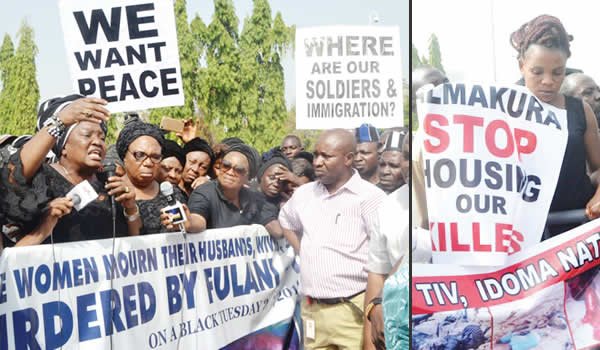Twin Tragedies Rock Benue as Protest Erupts and Massacre Leaves Dozens Dead
On June 3, tensions in Naka town (Gwer-West LGA) boiled over when protesters, incensed by the killing of three Civil Protection Guards by suspected herdsmen in nearby Gyaluwa, set a commercial truck—and its driver—ablaze. By nightfall, the Benue State Police Command reported detaining 18 suspects in connection with the violent demonstration and property destruction .
From Protest to Punishment
The bodies of three local security personnel were brought into Naka early that morning, igniting anger among youth groups who felt the state government had failed to protect them.
What began as a mournful march degenerated into rioting. Protesters torched the truck, the Local Government Secretariat, and the traditional ruler’s palace before security forces intervened.
According to the police public relations officer, Superintendent Catherine Anene, swift deployment of reinforcements quelled the unrest and led to multiple arrests—18 youths are now in custody as investigations continue .
A Wider Wave of Violence: Yelewata Massacre
Barely ten days later, overnight gunmen swept through Yelewata village (Guma LGA), unleashing one of the deadliest attacks the state has seen in years.
Amnesty International Nigeria reports at least 100 villagers killed, many burned alive in their homes, with dozens missing and hundreds injured—some still awaiting medical care. Witnesses describe gunmen using automatic weapons and fire to trap families indoors. Social media footage shows charred houses and bodies beyond recognition. Entire households were wiped out. While exact figures vary, local sources say some families lost more than 20 members, underscoring the brutality of the raid.
Underlying Causes
Violence in Benue’s Middle Belt is often traced to long-standing farmer–herder conflicts over diminishing land and water resources.
Herders cite colonial-era grazing rights, while farmers insist on protecting their farms from livestock incursions.
Anti-open-grazing laws passed in 2017 have seen patchy implementation, leaving communities vulnerable.
Though primarily economic, these clashes can flare into broader communal violence.
Official Responses & What Comes Next
Governor Hyacinth Alia dispatched relief teams to Yelewata and vowed to support survivors .
Heightened patrols, joint military-police operations, and community vigilance committees are being mobilized—but lasting peace demands more.
Civil society groups urge a comprehensive approach: enforce existing laws, mediate local disputes, and invest in water-management infrastructure to reduce resource competition.
Conclusion
The back-to-back crises in Naka and Yelewata lay bare the dual threats facing Benue State: spontaneous, protest-driven violence and premeditated, massacre-style attacks. While immediate security responses—arrests and relief deployments—are essential, sustainable stability hinges on addressing the root causes: land rights, law enforcement gaps, and intercommunal mistrust. Until these are resolved, Benue’s communities remain caught in a deadly cycle of retribution and grief.
If you enjoyed this article, click here to read more informative posts, also check us out on Instagram for fun and engaging content.
Disclaimer: The opinions, views, and information expressed in this article are those of the author and do not necessarily reflect the official policy, position, or views of iNaijanow. The company assumes no liability for any errors, omissions, or damages arising from the use of this information.
















